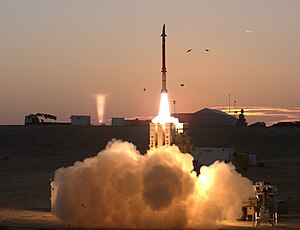| David's Sling missile system | |
|---|---|
 David's Sling weapons system Stunner missile launch during final milestone test | |
| Type | Medium to long range surface-to-air/anti-ballistic missile |
| Place of origin | Israel United States |
| Service history | |
| In service | Israel Defense Forces (2017–present) |
| Production history | |
| Designer | Rafael Advanced Defense Systems and Raytheon Missiles & Defense |
| Designed | 2009–present |
| Manufacturer | Rafael and Raytheon |
| Unit cost | US$700,000 [[1]] |
| Produced | 2017–present |
| Specifications | |
Detonation mechanism | Hit-to-kill kinetic warhead |
| Propellant | two-stage missile |
Operational range | 300 km (190 mi) |
| Maximum speed | Mach 7.5[1] |
Guidance system | AESA millimeter 3D radar + dual electro-optical/(FPA)/imaging infrared (CCD/IIR) seeker + asymmetric 360-degree multi-seeker sensor engagement + 3 way data link with advanced real time automatic and manual retargeting + ECCM & IRCCM |
Steering system | Asymmetric kill vehicle with super maneuverability |

David's Sling (Hebrew: קלע דוד, romanized: Kela David), also formerly known as Magic Wand (Hebrew: שרביט קסמים, romanized: Sharvit Ksamim), is an Israel Defense Forces military system jointly developed by the Israeli defense contractor Rafael Advanced Defense Systems and the American defense contractor Raytheon, that became operational in 2017. It is designed to intercept enemy planes, drones, tactical ballistic missiles, medium to long-range rockets and cruise missiles, fired at ranges from 40 to 300 km (25 to 190 mi).[2] David's Sling is intended to replace the MIM-23 Hawk and MIM-104 Patriot in the Israeli arsenal.[3]
The system's Stunner missile is designed to intercept the newest generation of tactical ballistic missiles at low altitude, such as the Russian Iskander and the Chinese DF-15, using on-board dual CCD/IR seekers to distinguish between decoys and the actual warhead of the missile, in addition to tracking by Elta EL/M-2084 Active electronically scanned array multi-mode radar.[4][5][6] The multi-stage interceptor consists of a solid-fuel rocket motor booster, followed by an asymmetrical kill vehicle with advanced steering for super-maneuverability during the kill-stage. A three-pulse motor provides additional acceleration and maneuverability during the terminal phase.[7] David's Sling became operational in April 2017.[8]
David's Sling was meant to bolster the second tier of Israel's theater missile defense system. The name David's Sling comes from the biblical account of David and Goliath.[9] It forms one level of Israel's future multi-tiered missile defense system, which also includes Arrow 2, Arrow 3, Iron Dome, and Iron Beam.
- ^ "David's Sling (Israel)". Missile Threat - CSIS Missile Defense Project. 13 July 2021. Archived from the original on 14 January 2024.
- ^ "U.S. Foreign Aid to Israel" (PDF). Federation of American Scientists. Archived from the original (PDF) on 31 July 2015. Retrieved 17 March 2017.
- ^ "Air Defense: Israeli Patriot Replacement". StrategyPage. 13 December 2012. Archived from the original on 15 December 2023.
- ^ "Israel scrambles the 8th Iron Dome unit with David's Sling elements". Missile threat. 11 July 2014. Archived from the original on 9 April 2015. Retrieved 30 January 2015.
- ^ "Israel Missile Chronology" (PDF). Nuclear Threat Initiative. January 2010. Archived (PDF) from the original on 30 October 2023.
- ^ Wall, Robert (23 June 2008), "New Israeli Anti-Rocket Projects Move Ahead", Aviation Week & Space Technology.
- ^ Fulghum, David A. (23 September 2010), "Missile-Killing Interceptors Eyed by Israel, US", Aviation Week's DTI.
- ^ Opall-Rome, Barbara (2 April 2017). "Israel marks operational deployment of David's Sling". Defense News. Archived from the original on 22 January 2024.
- ^ Bohn, Lauren E. (13 November 2012). "Israel missile defense system". USA today. Associated Press. Archived from the original on 31 January 2020.